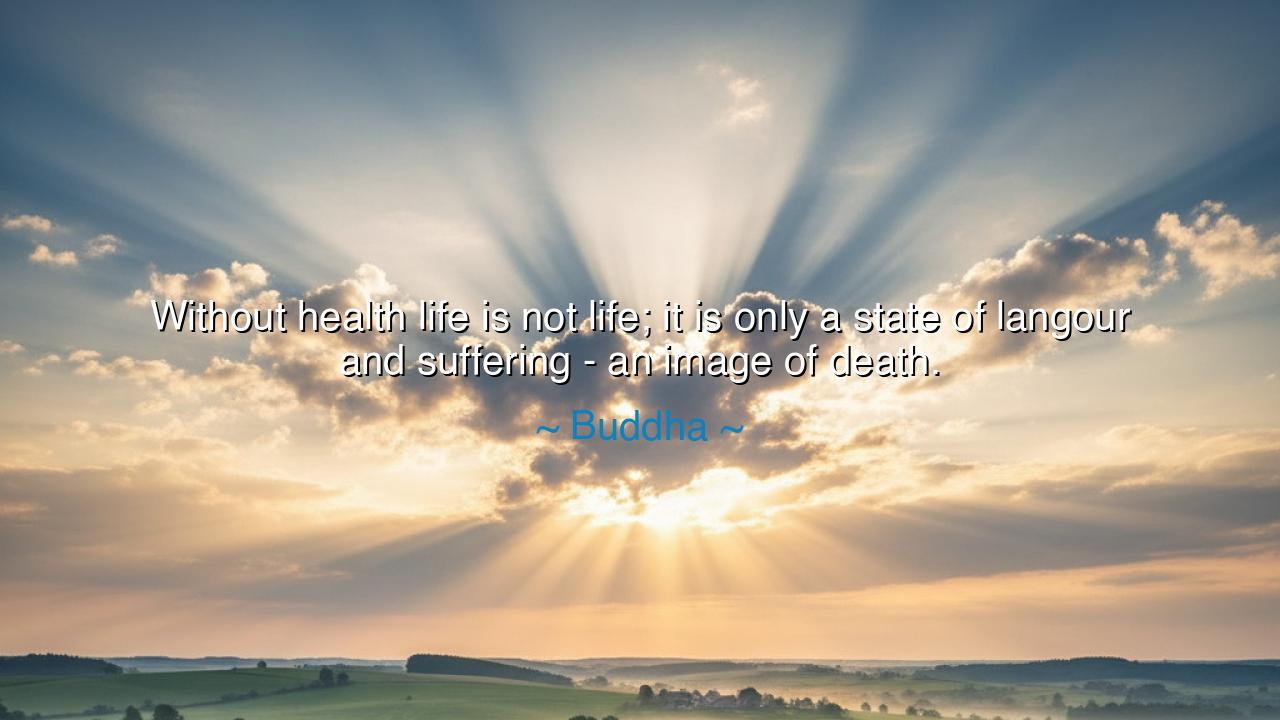
Without health life is not life; it is only a state of langour
Without health life is not life; it is only a state of langour and suffering - an image of death.






In the serene yet profound words of the Buddha, the awakened one who saw the nature of all things, there lies a truth that transcends time and language: “Without health, life is not life; it is only a state of languor and suffering — an image of death.” These words are not the lament of a pessimist, but the compassionate insight of a sage who understood the delicate balance between the body, the mind, and the spirit. The Buddha knew that health — not wealth, not fame, not even pleasure — is the foundation upon which all meaning in life rests. When health fades, life itself begins to dim, and what remains is not living but merely enduring.
The origin of this wisdom lies in the Buddha’s own journey. Born into luxury as Prince Siddhartha Gautama, he lived shielded from suffering until the day he left his palace and encountered the realities of existence: sickness, old age, and death. It was sickness that first shattered his illusion of permanence and comfort. He saw in the trembling of the ill the fragility of human joy, and he realized that no matter how gilded one’s surroundings, a body in pain knows no peace. From that revelation came one of the earliest understandings of suffering (dukkha) — that the root of misery lies not only in desire, but in the decay and imbalance of life itself. Thus, the Buddha taught that to tend to the body is not vanity, but wisdom, for the body is the vessel of enlightenment.
To say “without health life is not life” is to recognize that vitality is sacred. When the body is weak, even the simplest joys — a meal, a walk, the touch of the sun — become burdens. The mind, tethered to pain, loses clarity, and the spirit, unable to rise, sinks into despair. In this way, the absence of health becomes a living shadow, a state where existence continues, but without light. The Buddha’s phrase “an image of death” does not speak of finality, but of illusion — for one who lives in sickness without care for restoration dwells not in true life, but in a reflection of it, as though watching the world through mist.
History has shown us countless examples of this truth. Consider the tale of Florence Nightingale, who, amid the horrors of war, witnessed soldiers dying not from wounds but from neglect — from filth, malnutrition, and despair. Her revelation was the same as the Buddha’s: that health is the very breath of life, and that to restore it is to awaken the soul. Through care, cleanliness, and compassion, she turned death’s shadow into healing light, proving that wellness is not only the strength of the body, but the harmony of the spirit. In her hands, medicine became more than treatment — it became the art of rekindling life itself.
Yet health, as the Buddha taught, is not granted by chance alone. It is the fruit of balance — of mindful living, moderation, and compassion toward the self. When one eats without awareness, works without rest, or indulges in excess, one slowly drains the vessel of life. The ancients understood this deeply. The Taoists of China spoke of “living in harmony with the flow of nature,” while the Greeks praised moderation as the key to longevity. To care for the body is not selfishness; it is reverence — for in preserving life, one honors the divine spark within. The Buddha’s teaching calls us to discipline, not deprivation: to live gently, to eat with gratitude, to move with purpose, and to rest with peace.
It is also a lesson in compassion. To see another’s illness is to glimpse one’s own mortality; to ease another’s pain is to affirm one’s shared humanity. Thus, health is not merely individual — it is collective. A sick society cannot nurture well souls. When we pollute the earth, exploit the body, or neglect the poor, we weaken the very fabric of life. The Buddha’s wisdom invites us to heal not only ourselves, but the world — for only a healthy world can sustain healthy hearts.
The teaching, then, is as clear as morning light: cherish your health, for it is the sacred foundation of all joy and purpose. Do not squander it in haste or indifference. Feed your body with nourishment, your mind with stillness, and your soul with gratitude. When pain comes, meet it with awareness, not fear; when strength fades, remember that care and patience can restore it. To live fully is to live in harmony — not fighting against the body, but walking beside it as a friend.
So let the words of the Buddha be a lamp for all generations: “Without health, life is not life; it is only a state of languor and suffering — an image of death.” Remember this, O seeker of truth: the body is the temple through which wisdom flows, the soil from which enlightenment blooms. Guard it with humility, nurture it with love, and through that balance, life will shine — vibrant, awake, and whole. For to live healthfully is not merely to survive, but to honor the sacred gift of being alive.






AAdministratorAdministrator
Welcome, honored guests. Please leave a comment, we will respond soon